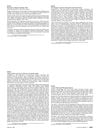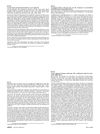 February 2013 in “Journal of the American Academy of Dermatology”
February 2013 in “Journal of the American Academy of Dermatology” Certain gene variations may increase the risk of alopecia, and platelet-rich plasma treatment can improve hair density in those with hair loss; a rare case of facial Becker's nevus was linked to uneven beard growth.
 January 2022 in “Journal of current research in food science”
January 2022 in “Journal of current research in food science” Eating healthy and exercising can help manage Polycystic Ovarian Syndrome and its related health problems.
 January 2017 in “Springer eBooks”
January 2017 in “Springer eBooks” Eating a balanced diet with specific nutrients can help manage menopause symptoms and prevent related health issues.
[object Object]  1 citations,
May 2016 in “Current Opinion in Pediatrics”
1 citations,
May 2016 in “Current Opinion in Pediatrics” Children's hair loss can be caused by various factors and should be treated with appropriate, age-specific methods and psychological support.
 30 citations,
May 2018 in “Experimental Dermatology”
30 citations,
May 2018 in “Experimental Dermatology” The conclusion is that future hair loss treatments should target the root causes of hair thinning, not just promote hair growth.
 November 2013 in “John Wiley & Sons, Ltd eBooks”
November 2013 in “John Wiley & Sons, Ltd eBooks” Skin symptoms can indicate endocrine disorders and have various treatments.
 1 citations,
October 2000 in “Pediatrics in Review”
1 citations,
October 2000 in “Pediatrics in Review” The document says that hookworms are treated with mebendazole and stress-related hair loss usually gets better in 6 months, while other hair loss types have specific treatments.
 10 citations,
June 2007 in “Journal of Oral and Maxillofacial Surgery”
10 citations,
June 2007 in “Journal of Oral and Maxillofacial Surgery” A man's rare tumor caused unusual nerve-related symptoms that improved after surgery.
 5 citations,
January 1998 in “Clinical and experimental dermatology”
5 citations,
January 1998 in “Clinical and experimental dermatology” Myotonic dystrophy should be considered in patients with hair thinning, and genetic counseling is important.

Patients with graft-versus-host disease often have nail changes related to the nail matrix, with severity not linked to skin condition.
 3 citations,
April 2018 in “Cosmetics”
3 citations,
April 2018 in “Cosmetics” As people get older, they have less active hair growth, but women have thicker hair than men and respond better to hair loss treatments.
 October 2016 in “Journal of the Dermatology Nurses’ Association”
October 2016 in “Journal of the Dermatology Nurses’ Association” Polycystic Ovary Syndrome (PCOS) affects 6%-15% of women of reproductive age, causing symptoms like acne and hair loss, and increasing the risk of type 2 diabetes and heart disease; it's managed through diet, exercise, and medications like Metformin and hormonal contraceptives.
 50 citations,
December 1998 in “Dermatologic Surgery”
50 citations,
December 1998 in “Dermatologic Surgery” Hair loss is more common in men aged 18-49 and increases with age.
 129 citations,
January 2007 in “Otology & Neurotology”
129 citations,
January 2007 in “Otology & Neurotology” Gene therapy with the Math1 gene helped regenerate balance-related cells and improve balance in mice.
 November 2017 in “Pediatrics in Review”
November 2017 in “Pediatrics in Review” A 4-year-old girl with hair loss was diagnosed with early-onset trichotillomania and improved with behavioral interventions.
 30 citations,
June 2015 in “British Journal of Dermatology”
30 citations,
June 2015 in “British Journal of Dermatology” Acne is common in women, often hormone-related, negatively affects quality of life, and requires various treatments.
 6 citations,
April 2018 in “Obstetrics, gynaecology and reproductive medicine”
6 citations,
April 2018 in “Obstetrics, gynaecology and reproductive medicine” Most women with hirsutism have it because of PCOS, and they need long-term treatment including medication and hair removal to improve their condition.
 5 citations,
February 2019 in “The New England Journal of Medicine”
5 citations,
February 2019 in “The New England Journal of Medicine” Certain mutations in the PADI3 gene may increase the risk of developing a type of scarring hair loss common in women of African descent.
 6 citations,
January 2021 in “Annals of Dermatology”
6 citations,
January 2021 in “Annals of Dermatology” 650 nm red light helps hair grow and prevents hair loss by affecting certain genes and biological processes.
 1 citations,
January 2013 in “Advanced Biomedical Research”
1 citations,
January 2013 in “Advanced Biomedical Research” Men with more severe hair loss had a lower risk of schizophrenia, but hair loss and testosterone levels were not linked.
 January 2020 in “Journal of Cosmetics, Dermatological Sciences and Applications”
January 2020 in “Journal of Cosmetics, Dermatological Sciences and Applications” DEEPLY ROOTED® supplement seems to effectively improve hair growth and quality in women with no side effects.
 February 2009 in “Journal of The American Academy of Dermatology”
February 2009 in “Journal of The American Academy of Dermatology” Pulsed dye laser treatment was effective for a skin condition resistant to other treatments.
July 2013 in “Indian Journal of Dentistry” A 46-year-old man showed symptoms of a rare condition usually seen in postmenopausal women, highlighting the need for dentist-dermatologist collaboration.
 101 citations,
April 1994 in “Baillière's clinical endocrinology and metabolism”
101 citations,
April 1994 in “Baillière's clinical endocrinology and metabolism” 5α-reductase is essential for male sexual development and its inhibitors have potential in treating various conditions related to hormone action.
 51 citations,
November 2005 in “Journal of Medical Primatology”
51 citations,
November 2005 in “Journal of Medical Primatology” Alopecia in captive rhesus macaques is affected by season, sex, age, housing, and stress, with complex links between stress hormones and hair loss.
 October 2019 in “International journal of clinical & experimental dermatology”
October 2019 in “International journal of clinical & experimental dermatology” Female pattern hair loss greatly affects quality of life, especially in younger patients, those with the condition for a long time, and those with mental health issues. A more comprehensive treatment approach is suggested.
[object Object]  14 citations,
July 2019 in “Experimental and Molecular Medicine”
14 citations,
July 2019 in “Experimental and Molecular Medicine” Nanog gene boosts stem cells, helps hair growth, and may treat hair loss.
 68 citations,
March 1965 in “The BMJ”
68 citations,
March 1965 in “The BMJ” Hormones and genetics affect hair growth and patterns, with some changes reversible and others not.
 December 2016 in “Springer eBooks”
December 2016 in “Springer eBooks” A 45-year-old woman with autoimmune diseases experienced patchy hair loss due to alopecia areata, which has no cure but can be treated, with varying success.
17 citations,
November 2021 in “Journal of Cosmetic Dermatology” Combination therapies for androgenetic alopecia work best but can have significant side effects and costs.



























